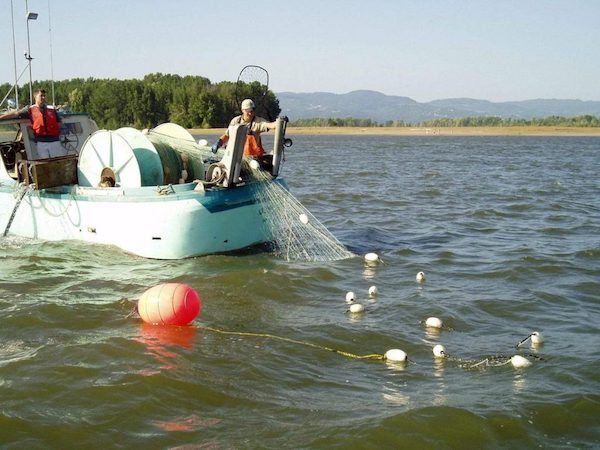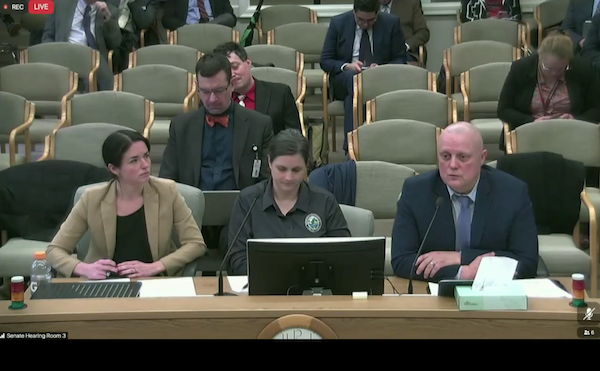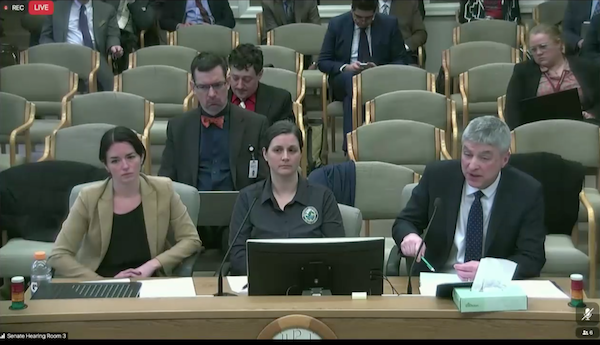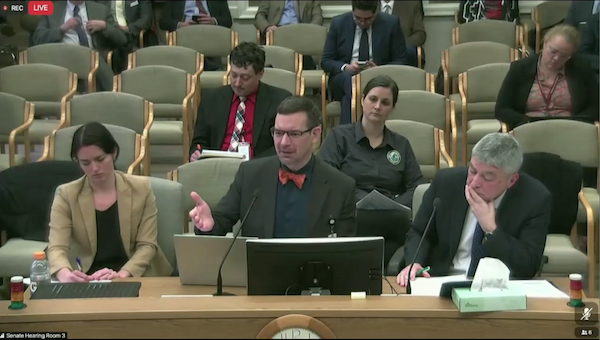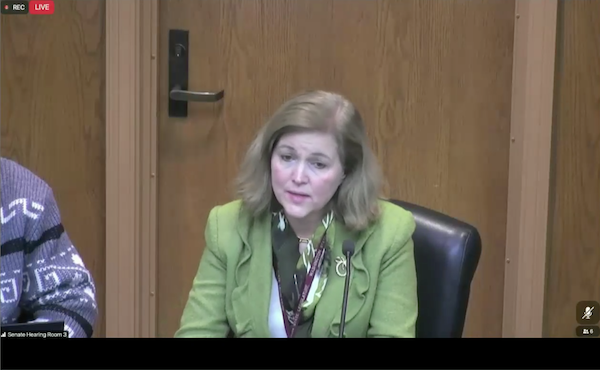
Senators Unhappy With WDFW Columbia Gillnet Buyback Program
When you’re dealing with gillnets, you’re fundamentally dealing with a bunch of knotty holes. You’ll catch a lot of fish, but some might just swim through or around the mesh.
That’s more or less what lawmakers and WDFW are left to stew about following a workshop in Olympia Thursday afternoon on the $14.4 million Columbia River voluntary gillnet license buyback proviso passed and implemented, respectively, by the two parties last year.
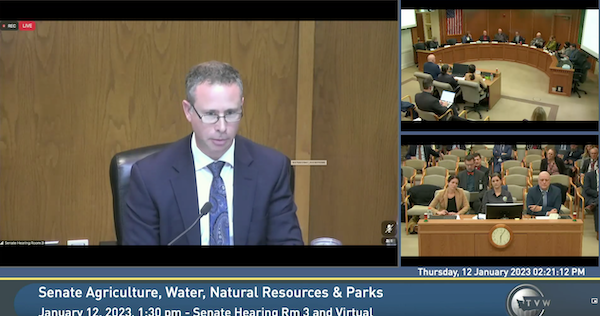
Senators were unhappy with how taxpayers’ money has been spent, including up to eight times as much as previously expected on some non-Columbia licenses, termed actions by at least one buyout participant who is still gillnetting “unethical,” and were displeased that WDFW didn’t appear in their eyes to have yet considered what to do with the subsequent reduced gillnet impacts on salmon and steelhead.
For one meeting observer, it amounted to a trip to the “woodshed” for the agency; it left another’s blood boiling.
For its part, WDFW strongly defended the program it considers to be a success after having permanently retired 70 percent of Washington gillnet licenses for the Columbia, Willapa Bay and Grays Harbor so far, and if a few netters turned a tidy profit in the buyback process and are still gillnetting in state waters, it might have been shady but it was also legal because language that would have barred doing so – like in a 2020 budget proviso the agency supported but got vetoed at the last minute – wasn’t included in lawmakers’ 2022 proviso.
It all amounted to a very lively kickoff of the 2023 Senate Agriculture, Water, Natural Resources & Parks Committee – through which any number of WDFW-related bills still must first pass during this long session of the state legislature.
THINGS HEATED UP AFTER WDFW Columbia River manager Dr. Charlene Hurst provided a presentation on the buyback program, the background – removing nontribal gillnets from the lower mainstem Columbia as a policy dates back to at least 2012-13 and the Kitzhaber plan worked on by Washington’s and Oregon’s Fish and Wildlife Commissions – and the, er, tangled web of salmon impact management.
“I would say that we’re excited to finally see a gillnet buyback being implemented. It’s good to see that moving forward,” acknowledged Sen. Jesse Salomon (D-Shoreline), before offering an alternate set of findings on the program. “I will say, we’ve done our own look at this through our public records requests and not all of us – I think I can fairly say that – feel quite as sanguine about the way this buyback has been implemented.”
Half of his concerns centered around implementation of the proviso’s “Subsection B,” which deals with how the license buyout is meant to shift gillnetter impacts on wild and/or ESA-listed stocks.
“Legislators and the public are alarmed by DFW’s failure to commit the following subsection of the budget language directing the harvest impacts associated with retired gillnet licenses benefit the conservation of wild salmon rather than be shifted to other gillnet fishers,” Salomon said as he read from a prepared statement. “This raises a possibility that DFW could spend $14.4 million in taxpayer funds to buy back gillnet licenses with no benefit to salmon conservation – in direct conflict with the intent of the legislature.”
Where much of a state agency’s budget from lawmakers is discretionary, a proviso is a direct request to work on a very specific thing. It often comes with a report-back requirement. Funding for this proviso came from the state General Fund, not fishing license dollars.

Salomon added that data from a PDR raised “serious questions” about how WDFW had spent the funds, including paying $7 million to buy 88 licenses “that had no Columbia River landings,” for an average of $79,545, despite he and two other high-ranking senators “urging WDFW to direct higher authorized purchase amounts to licenses with actual fishery landings.”
“In 2021, WDFW had proposed purchasing many of these licenses for $10,000, and these licenses were worth about $5,000 on the private market,” Salomon stated.
(An outside source reported coming across similar prices while shopping for a boat.)
Salomon said that that then limited the amount WDFW could pay for “truly active” gillnet licenses, spending $7.16 million to buy 81 more licenses with actual Columbia River landings, for an average of $88,395 per license, “far less than the up to $125,000 authorized in the buyback,” a discrepancy that he said likely lessened the program’s overall effectiveness.
The senator also stated that WDFW didn’t take steps “to prevent the buyback from being abused by license holders,” stating that 20 remaining gillnet license holders had sold 32 licenses.
“In most cases, these license sellers sold an active license at a higher price and then proceeded to purchase an inactive license or an on-waiver license at a lower cost and pocketed the difference, or activated ones that they had already owned. As part of our preliminary analysis, one license holder – I have the name here but I won’t say it publicly yet – sold four active licenses for approximately $350,000 and then proceeded to buy an inactive or on-waiver license in order to continue (their fishing). Another group sold three active licenses, purchasing two inactive licenses and also presumably pocketed the difference. There’s nothing preventing these individuals from continuing to participate in the fishery despite that payout,” he said.
Salomon said that WDFW had been warned about that particular risk in a May 2022 letter from nine sportfishing and conservation organizations – CCA, Wild Steelhead Coalition, NSIA, TU, NMTA, Association of Northwest Steelheaders, Northwest Guides & Anglers Association, among others – after the proviso was passed.
“As a voluntary buyback, WDFW had latitude to include such requirements as a condition of purchase but chose not to,” he said.
ELIMINATING GILLNETTING HAS LONG BEEN A GOAL of Salomon, vice chair of the senate committee, as well as its chair, Sen. Kevin Van De Wege (D-Sequim), who himself had a keen followup question for WDFW.
“How aware was the department that fishers were going to sell licenses in the buyback program and continue gillnetting?” he asked.
“We were extremely aware,” responded Fish Program Director Kelly Cunningham.
“The fact of the matter is the previous proposal that we put forward that was ultimately vetoed, we talked about the need for some authority to be able to deal with that,” he stated. “The fact of the matter is, as it stands today it is completely legal for fishers to do that. There is nothing illegal about it. And in order for us to prevent something like it we would need express statutory authority to do so, and we do not have that at this point in time. It’s something that’s been on our minds since we started talking about buyback dating back to 2013.”

He added that there was also nothing stopping a Washington gillnet license seller from buying one from Oregon on the open market to fish the Columbia, “so it is a challenge.”
The two states, along with four upstream tribes, jointly manage the shared lower 300 miles of the Columbia, with all nontribal commercial netting occurring below Bonneville Dam. Nontribal gillnetting is only done on fall Chinook and coho, though it’s possible during strong spring and summer Chinook runs due to a controversial change made in September 2020 by the Washington Fish and Wildlife Commission. A bill that Salomon and Van De Wege introduced earlier this week at the request of Governor Inslee would override that.
Van De Wege pressed Cunningham, asking, “What would prevent the department from going through the rulemaking process and making a rule that people have to sign if they’re going to enter a buyback program, that they vow to stop gillnet fishing? Since that’s the purpose of a buyback.”
Cunningham indicated it might be possible, but also questioned whether that approach “would stick in a court of law.”
Slightly exasperated, Van De Wege asked why WDFW hadn’t made those particular points to lawmakers last year as they worked on the proviso, to which agency legislative liaison Tom McBride said they hadn’t been invited into negotiations and only saw the language after it was written.
McBride also pushed back on Sen. Salomon’s arguments that WDFW had retired the wrong licenses, terming the kit and caboodle “undifferentiated … They can be reactivated at any time or sold at any time. So getting rid of the inactives is as important as the actives.”
He later termed them “interchangeable.”
“Bottom line, why does it matter when the truth of this fishery is there are 240 licenses. Every single one of those licenses has the same authority and opportunity to access the entire fishery,” McBride said.
WDFW sells two Columbia gillnetting licenses: one authorizes license holders to fish Grays Harbor and the Columbia, the other to fish Willapa Bay and the big river. Out of the 240 active and inactive licenses – 59 of the former, 181 of the latter – at the start of 2022, to date 151 actives and 18 inactives have been retired, according to WDFW, leaving just 16 licenses to gillnet the Columbia and the Harbor and 55 to gillnet the lower river and Willapa, or 70 total. (One Willapa-Columbia license wasn’t renewed.)
The recently retired licenses accounted for an average of 37.1 percent of all fall Chinook and 33.5 percent of coho landings on the mainstem Lower Columbia from 2017 through 2021, according to WDFW figures presented by Hurst.
“Seventy percent of all licenses removed already, and maybe a little bit more, and every commercial fisher had a chance to participate. It’s been a success,” McBride argued. “And this discussion about what was the intent, you only go to legislative intent if the language is not clear. The language of the proviso is what we follow. We’re not going to deviate from the language that you actually voted on the floor of the Senate or the floor of the House. We’re just going to do what you told us to do there.”
Van De Wege addressed both McBride’s and Cunningham’s takes on WDFW’s implementation.
“I don’t think anybody’s arguing that it was not a successful program. It was a successful program and I think we all thank you for that,” he said. “I think saying somebody can sell back a license and simply buy another one and continue gillnetting and essentially wasting taxpayers’ money, saying that’s ‘legal’ is I think suspect. Unethical for sure; I think nobody would disagree that it’s unethical. But I think saying it’s legal is suspect, and I think we need to ask more about that. Were you guys aware that somebody sold back four licenses and is still gillnetting today? That’s hundreds of thousands of dollars of taxpayers’ money, and the person’s still gillnetting.”
“I don’t like it anymore than …,” began McBride.
“And I know you don’t like it anymore than we do,” acknowledged Van De Wege. “Our job is to pass the laws … and yours is to do the rulemaking and implementation. We can’t as a legislature think of every scenario that’s gonna come up. I would never, ever have imagined that somebody would sell back licenses and still be gillnetting.”
As his voice began to break in apparent anger, Van De Wege added, “That to me is very wrong.”
McBride, again referencing how Washington gillnetters can simply go purchase available Oregon licenses, said taking a Washington-only approach in the buyback was always going to be problematic, but he appeared to confirm Salomon’s earlier statements around a few netters retiring some licenses but activating others and continuing to fish.
“I agree with you this was a hole,” said McBride. “It was a hole for a handful of cases, but I will say the success of the overall program got us to where we want to be with this big 70 percent reduction.”
WDFW’S LAWYER JOE PANESKO of the state Attorney General’s Office rose to address why WDFW couldn’t retire all those licenses AND close the loophole at the same time under the budget proviso.
“With respect to your question about, ‘Could they have done rules?’ my answer would be ‘Flat-out no,'” said Panesko, “because all you gave the department was a budget proviso. Budget provisos are not substantive law. Agencies can only do rulemaking if they have direct statutory authority to do so … If the legislature wanted to limit people who sell their license from acquiring another one and participating in the fishery again, they could have done something like adopted language that can be found in RCW 77.70.280, which involved a crab buyback, and subsection 7 of that statute expressly precluded individuals who went into the buyback program from participating in the fishery for another 10 years. That’s substantive legal authority. The budget proviso that the legislature passed last year simply did not give the department the legal authority to achieve something the legislature needed to do through statute.”
Panesko added that there are also license transferability rules in state law and neither the proviso nor WDFW could undo that authority.
“It would have been great to have you around last year when we were working on this,” noted Sen. Christine Rolfes (D-Bainbridge Island), who is also chair of the Senate Ways and Means Committee, before asking Panesko if it was possible for lawmakers to retroactively say that anyone who participated in the buyback couldn’t work the three Southwest Washington gillnet fisheries.
Panesko declined to offer an opinion on that during an open public meeting for various legal reasons.
“The goal of the proviso was not to transfer $16 million dollars to people who fish on the river,” continued Rolfes. “The goal was to see if we could hold people harmless, essentially, while beginning to manage for abundance and getting a better conservation value.”
She seemed to focus on wanting to move forward on the conservation elements of the proviso.
“Subsection B calculation is being done,” McBride said a few minutes earlier as he pivoted to Salomon’s main concerns, including around how the impacts from retired gillnet licenses will be reallocated. “It will impact future fisheries. Nobody here can promise you what that looks like. There’s not a desire to not do this. There’s a desire to do it right.”
McBride also said he would have wanted to be part of the process that led to the proviso and that lawmakers “gotta let us in the room” to do so, but Van De Wege didn’t sound too welcoming.
“To me, the department has shown a lot of examples of how they’re wedded with the gillnet industry and that is enormously frustrating to us. And that I think is part of the reason you maybe weren’t in the room when we were writing this proviso, because I think some of us find there’s not a lot of honesty and help there,” he said.
It was a response meant to cut WDFW deeply and confirm what many anglers already suspect, but it was also somewhat pyrrhic because it essentially confirmed what the agency argued – that the legislature should have included a clause barring buyout participants from double dipping with another available gillnet license, as in 2020, and that might have been pointed out if WDFW had been invited into the room.
THIS MORNING, WDFW’s CUNNINGHAM DID NOT DISPUTE any of Sen. Salomon’s statements around how much the agency had paid for gillnet licenses, that some licensees had been horsetrading, and that one had sold four to the state at a substantial windfall and was still gillnetting.
Asked if WDFW had anything to add, he reiterated points he, McBride and Panesko had made: “We implement legislative mandates, including provisos, as they are written. We were directed to buy back ‘active’ and ‘inactive’ licenses. There were price caps for each category. We were further directed to calculate the impacts associated with the licenses that were bought back. We are doing that. The language in the proviso was specific and the direction was clear.”
Asked if it all would impact the likelihood of WDFW being able to secure $5.9 million from lawmakers for steelhead monitoring on the coast – including rivers flowing through the expansive Olympic Peninsula district of a certain Senate Agriculture, Water, Natural Resources & Parks Committee chairman – Cunningham responded, “Good question.”
As I’m not known for asking good questions, I have to assume that it was reflective of the budget request’s future after Gov. Inslee didn’t include it in his two-year spending proposal unveiled last month.
And that is going to have to be all the time I have for this barrel of fun.
Correction 9:30 a.m., January 17, 2023: The crab license buyback RCW referenced in paragraph 43 by WDFW lawyer Joe Panesko of the state Attorney General’s Office is actually 77.70.280, not 77.72.080. The writer’s hearing will be checked and the fact checker flogged.

